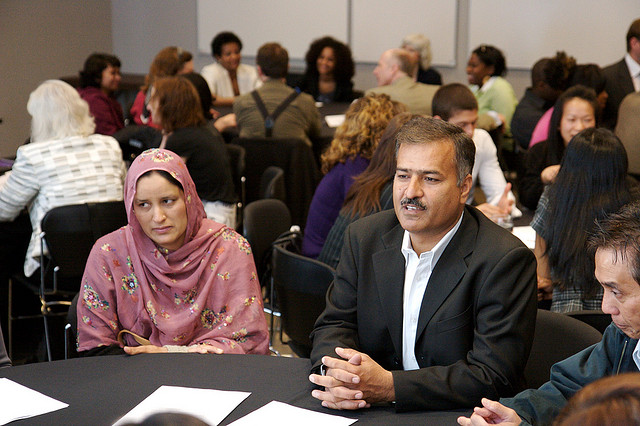Along the continuum of cross-cultural experiences, becoming an immigrant and deciding to live full-time in another culture provides the most intense cross-cultural experience. Issues commonly faced by immigrants are the acquisition of language skills, accreditation of academic and job credentials, job search, child care, cultural adjustment and many others involved in setting up a new life away from home.
I connected with Skills for Change about a year and a half ago and I think they do wonderful work in helping immigrants adjust to the Canadian workplace. Several of my full-time employees have come from Skills for Change and they are a testament to the dedication and commitment that new immigrants are often willing to offer to an employer.
Canada is a typical immigrant country and it is no exaggeration to say that in today’s climate, the health and well-being of entire communities and societies depends on the successful integration of new immigrants. Skills for Change is a leader in its field and has been visited by a number of delegations from Europe to inform them about their unique programs.
Skills for Change has developed a number of outstanding innnovative programs to help foreign-trained workers adjust successfully in Canada. Here is Jane Cullingworth, Executive Director of Skills for Change, to talk about the mission and programs of this great organization.
1. Please give us an overview of Skills for Change. What is the objective of your organization? How is it funded?
Established in 1982 as a charitable organization, Skills for Change (SfC) provides learning and training to immigrants and refugees in preparation for entry to the labour market and the wider community. Over the years, the organization has evolved to meet the changing needs of newcomers and has enhanced its services by pioneering the design and delivery of innovative sector-specific, employment focused programs. We are funded by government (federal, provincial and municipal), by foundations (including the United Way), private donations, fundraising; we also charge for some of our services (for example, computer training courses).
2. Please tell us about the history of Skills for Change.
In 1983, the Toronto Office Skills Training Project was funded to provide language and clerical skills training to Indochinese women. By 1988, the training was opened up to all immigrant women; when the agency moved to its current location in 1989, part-time language/linked skills courses were offered to men and women, in partnership with the Toronto Board of Education. SfC is best known for developing and pioneering the sector-specific program and service model. With this model as a framework, the agency had introduced such services as Mentoring for Employment, sector-specific programming for internationally-trained professionals (1998) and the Ontario Network for International Professionals Online (onip.ca) web site (2003). In 2004, SfC developed and piloted bridging programs for internationally-trained teachers and tradespeople.
3. What type of people come to you for assistance?
Underemployed or unemployed immigrants and refugees in need of language, skills and employment-preparation training or services. Women and men of diverse cultural and racial backgrounds seeking entry into the workforce: unemployed immigrants or refugees/social assistance recipients.
4. What are some of the common issue that new immigrants face?
Language barriers, credential recognition, cultural differences, financial, systemic barriers, lack of Canadian work experience, lack of knowledge of resources, and limited access to bridging programs and education that can address specific skills gaps.
5. Please tell us about some of your programs in the clerical, finance, accounting and retail areas.
Intake, Assessment and Referral
·Assessment of language, training and employment needs
·Referrals to appropriate internal and external programs and services
Sector-Specific Employment-Preparation Programs/Services
Bridge to Success for Trades: 12-week program serves three trades: industrial electricians, construction and maintenance electricians and industrial mechanics or millwrights; participants are prepared for their Certificate of Qualification exams. Pilot phase has just been completed; now awaiting announcement re: Phase 2 funding from Citizenship and Immigration Canada.
Clerical Employment Services (CES): two-week job search program for clients seeking clerical, customer service or related employment
Customer Service Skills: six-week course; generic customer service principles and hands-on practice
Employment Preparation for Retail Services (EPRS): 15-week program with six-week placement at the Bay
Employment Resource Centre: self-serve centre provides job search resources, workshops and coaching to job seekers in the community
ESL/Accounting and Computer Skills for Immigrant Women: 11-week course in accounting principles, MS Office and business communications
Finance and Office Assistant Program (FOAP): 24-week program for social assistance recipients; four-week placement; funding ends in December 2005
Job Preparation for Internationally-trained Accountants and Bookkeepers (ITAB): funding ended March, 2005
Job Search Workshops (JSW): 18-hour program delivered in the evenings and during the day
Mentoring for Employment: matches job-ready clients in professions such as accounting, engineering, human resources, teaching and life sciences to mentors in their fields
Sector-specific Information Sessions: three-hour information sessions for engineers, accountants and teachers in association with the Professional Engineers of Ontario, the Institute of Chartered Accountants of Ontario and the Ontario College of Teachers
Teach in Ontario: six-week program for internationally-trained teachers; includes group information sessions, language assessment and training delivered in English and French, and help with job search strategies
TechSkills: These fee-for-service instructor-led courses train newcomers, the general public and SfC graduates in technical skills such as Quality Assurance and Control Training (QACT), Oracle and MCSE/MCSA
6. Please tell us about your language training programs.
Language Training
·LINC Levels 2 to 5, with a childminding service
·ESL/workplace skills courses offered in conjunction with the Toronto District and the Toronto Catholic District School Boards
·Language Upgrading for Internationally-trained Teachers (instruction provided by the Toronto Catholic District School Board)
·Enhanced Language Training (ELT) workshops for internationally-trained tradespersons and agrologists
7. Please tell us about your job search, coaching and mentoring programs.
Job Search Workshop for New Immigrants (JSW) is designed to assist Newcomers in finding employment in Canada.
Newcomers learn job search strategies, skills identification, resume and cover letter writing, labour market trends, accessing the hidden job market, interview skills, Internet and computers for Job Search purposes.
Mentoring is an employment preparation program for internationally-trained professionals in areas such as accounting, engineering, human resources, teaching and life sciences. Mentors work with clients to help them achieve their employment goals while they are seeking work. All participants in thee Mentoring program are successful graduate of employment preparation courses at Skills for Change or other approved agencies. Registration is done through Counsellor referrals and an interview process.
8. What type of settlement services do you offer to newcomers?
· Skills for Change in partnership with South Asian Women’s Centre offers settlement services to newcomers such as information, Guidance and Advocacy. The following services are available to all drop-in newcomers:
· Assistance related to immigration and sponsorship
· Help and information regarding social assistance
· Information related to community resources, child care, health, housing and legal issues
· Supportive counseling
· Support and advocacy related to family violence
Monthly Settlement Information Sessions are conducted and thee topics include:
· Introduction to Community Resources
· Domestic Violence and Family Law
· Resources for Victims of abuse
· Mental Health, Stress Management and Coping
· Immigration, Sponsorship and Citizenship
· Introduction to ODSP, EI and Social Assistance
· Child Safety
· Regulation and Resources
One2one Coaching is a free service of Skills for Change and the Dufferin mall Employment Resource Centre (DERC). All coaching takes place at the Duffering Mall Employment Resource Centre. One2one Coaching is for job seekers looking for work in any field. You may need help with your work search documents, preparing for an interview or conducting an effective job search. Our coaching team can help you with resume critiques, cover letter reviews, mock interviews, and much more.
Currently our DERC is located at our 791 St. Clair Ave. W. location. The program will be relocating to another location in the next couple of months.
9. What type of services do you offer to employers?
Human Resources Services for Employers is specifically for corporate HR and Training departments. Designed to assist companies with recruitment, placements and professional development and retaining their diverse workforce.
10. What are the New Pioneer Awards?
Recognizing the Achievements of Immigrants and Refugees
New Pioneers Awards: an annual gala event honouring immigrants and refugees for their achievements
The New Pioneers Awards recognize the contributions made by immigrants and refugees and are awarded in six categories:
Arts
Community Service
Entrepreneurship (Business to be in operation for a minimum of three years and must employ staff)
Science and Technology
Youth
Skills for Change Graduate (restricted to those who have used the agency’s programs and services)
We invite nominations of outstanding individuals who fits the following selection criteria:
Demonstrate through their residence, work and/or community activities a real and substantial connection to the Greater Toronto Area
Be born outside of Canada
Be an outstanding achiever
Have made contributions to the immigrant, refugees and/or wider community
Have overcome barriers in starting a new life in Canada
Be over 18 years of age (with the exception of the youth award that is open to individuals 16-24 years old or up to 29 if disabled)
The selection of the recipients is conducted by teams of volunteers who have knowledge and expertise in the field. The information given in the nomination form is reviewed and graded and the short listed candidates are interviewed. The nominees who are selected as the recipients are individuals who closely match the selection criteria of the awards.
The New Pioneers Awards are presented in March each year at a prestigious dinner event. Each recipient receives a handcrafted trophy from a sponsor representative. The Youth and Skills for Change Graduate Award recipients receive $1,000 respectively.
11. Please tell us about some of the success stories of Skills for Change.
Susan*, originally from China, came to Canada in March 2000 with an MSc in Computer Engineering from a university in Ireland. In March 2003 she became a client of Employment Assistance Services and spent several months under the guidance of her EAS employment counselor. The EAS Job Developer began to work with Susan in June.
The Job Developer immediately noticed that Susan had solid experience as an SAS Programmer Analyst. He suggested she focus on searching for jobs in that sector and gave her some ideas on how to research and cold-call companies.
One month later Susan informed the Job Developer that two cold calls had resulted in two interviews, one in Ottawa with Government of Canada and another with TD Bank in Toronto. She met with the Job Developer prior to the interviews. Both interviews went well, and Susan was offered jobs with both employers.
Susan decided to stay in Toronto and is now working for a large Canadian bank as a Business Information Analyst.
Susan wrote her Job Developer:
“Thank you so much for helping me on my job hunting. I benefited a lot from EAS, especially résumé correction, the mock interview and cold calling workshop. Without your help, I would not succeed today. I am really grateful to you for your help.”
Joseph* is from the Philippines. He immigrated to Canada in April 2001 with the hopes of enhancing his already rich career and moving to newer horizons. His educational background includes a Bachelor of Science degree in Electronics and Communications Engineering, and a Master’s Degree in Business Administration; he has enjoyed several professional development opportunities in project management, target selection, and quality/control management.
He had worked at reputable and internationally famous companies such as Siemens and UNISYS in his country, with his last job title being Senior Project Manager.
Networking and the Internet were the main sources that Joseph utilized to conduct his job search. When he joined the EAS Program, he had a résumé and cover letter that he had constructed on his own, getting assistance from books, Employment Resource Centres, and the Internet. Joseph participated in the EAS Work Search Strategies Workshop, and he benefited from individual résumé critique. He was proactive in researching and networking with companies.
Joseph’s persistence and hard work paid off very quickly. Two months after he joined EAS, he secured a full-time permanent position as a Project Manager at a reputable telecommunications company.
13. Please tell us about the foreign delegations from countries like Sweden and Germany, who have visited your organization.
SWEDISH DELEGATES
On October 17, 2005 Skills for Change had the honour of hosting a delegation from Stockholm, Sweden.
The delegation was in Toronto for the Metropolis Conference and was interested in learning about how our agency provides programs and services to immigrants and refugees.
The party included representatives from Stockholm city government (elected officials – including the Vice Mayor – and civil servants), political parties, regional government, as well as a researcher from the Lund University.
We all enjoyed the opportunity for dialogue about the opportunities and challenges posed by integration initiatives in our two cities. Thank you to the City of Toronto for coordinating the event.
DANISH DELEGATES
A delegation from the Danish Federation of Trade visited Skills for Change on April 10, 2003. The group is studying Canadian integration policy, labour market and other related issues for immigrants. Most of the participants are members of, and working in, different Danish Trade Unions or in municipalities.
VARIOUS DELEGATES
Skills for Change hosted group of 19 delegates attending a conference entitled “Career Guidance: Bridging the Gap”, who have expressed interest in visiting our site, the host of the conference is HRDC and the group will be visiting the HRC at St.Clair/Yonge prior to coming to SfC.
They were at Skills for Change on Oct.8, 2003. The delegation is comprised of Career practitioners, Policy Makers, and Academics from around the world. To give you a sense of the diversity: they come from Germany, Ireland, Korea, New Zealand, Poland, Luxembourg, Portugal, Romania and South Africa. Turkey.
Thank you, Jane, for giving us an overview of the various initiatives that your organization. We wish you all the best for your future initiatives in helping new immigrants successfully adjust to life in Canada.




